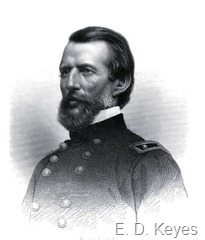October 3.—The rebel General Bragg issued an order from his headquarters at Lexington, Ky., ordering that the paper currency of the confederate States should be taken at its par value in all transactions whatever, public or private. The order also stated that the refusal to take it, or the exaction of exorbitant prices, would be treated as a military offence, and punished accordingly.
—The advance brigade of Gen. Geo. W. Morgan’s command, from Cumberland Gap, reached Greenupsburgh, Ky., after a march of sixteen days. Many of them were “hatless, shoeless, and naked.” They had marched twenty miles a day, skirmishing with the rebels as they advanced.
—Clement C. Clay, Senator from Alabama, submitted the following preamble and resolution in the rebel Congress in session at Richmond, Va,:
Whereas, It is notorious that many and most flagrant acts violative of the usages of war, of the rights of humanity and even of common decency, have been, and still are being, perpetrated by the forces of the United States upon the persons and property of citizens of the confederate States; and, whereas, such outrages cannot be fully known and believed whilst resting only in the oral statements of citizens in different and remote States, and in the hasty paragraphs of newspapers published in the different and remote localities;
Now, therefore, that the evidences of the said outrages may be collected and preserved in a permanent and credible form, and the truth of history thus vindicated, and the perpetrators delivered to the just indignation of present and future generations, •
Resolved, That a Committee of thirteen Senators, or of one from each State, be appointed by the President of the Senate, whose duty it shall be to take, or cause to be taken, in such manner and form as they shall prescribe, the testimony in relation to such outrages, and after making report at such time as they shall deem proper, the report and the testimony shall be deposited in the Department of Justice; and that the objects of this resolution may be attained, the Committee shall have power to send for persons and papers.
—A Union expedition, consisting of one thousand five hundred troops and seven gunboats, from Hilton Head, S. C, under command of Gen. Brannan, which had concentrated at St. John’s River, Fla., attacked and occupied the rebel fortifications on St John’s Bluff, capturing nine guns and a large quantity of munitions, provisions, and camp equipage abandoned by the rebels in their retreat The gunboats afterward ascended the river to Jacksonville, the rebels retreating at their approach.
—From his headquarters near Sharpsburgh, Md, General McClellan issued a congratulatory order to the army under his command, for the victories achieved by their bravery at the battles of South-Mountain and Antietam. Fourteen guns, thirty-nine colors, fifteen thousand five hundred stand of arms, and nearly six thousand prisoners taken from the enemy, were, he said, evidences of the completeness of their triumph.
—A joint resolution was adopted by the Virginia (rebel) Legislature, providing that no person within that State should be tried or imprisoned for driving therefrom or putting to death, by any means, any person, with or without arms, who might be found on that soil aiding or abetting, or in any other way giving effect in that State or its borders to the “lawless and fiendish proclamation”‘ of President Lincoln to liberate the slaves.— Richmond Dispatch, October 4.
—This morning a fight took place along the banks of the Blackwater River, in the vicinity of Franklin, Va., between three Union gunboats, Commodore Perry, Hunchback, and Whitehead, under the command of Capt Flusser, and a force of rebel troops nearly nine thousand strong, resulting, after an engagement of six hours’ duration, in the killing and wounding of a large number of the rebels, when the gunboats retired with a loss of nineteen killed and wounded.
—The ships Brilliant and Emily Farnham were this day captured by the rebel steamer Alabama, in lat 40°, Ion. 50° 30′, the crews taken off, the ships plundered of their provisions and valuables, and burned.
—A reconnoitring expedition, consisting of three regiments of infantry, a regiment of cavalry, and a battery of artillery, under the command of Acting Brig.-Gen. Spear, left Suffolk, Va., and proceeded to the Blackwater River opposite Franklin, where the rebels were discovered in considerable force. An artillery fight ensued, resulting in the retreat of the rebels with a loss of about thirty killed and sixty wounded. The Nationals then returned to camp.—National Intelligencer, October 7.
Erasmus Darwin Keyes (May 29, 1810 – October 14, 1895) was a businessman, banker, and military general, noted for leading the IV Corps of the Union Army of the Potomac during the first half of the American Civil War. (Wikipedia)



